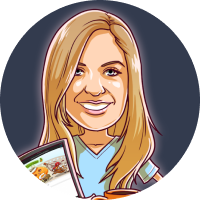Being a nurse practitioner (NP) is an exciting job that takes a ton of dedication and hard work. The demand for nurse practitioners is high, and there are many different areas of specialization: family nurse practitioner (FNP), adult gerontology acute care nurse practitioner (AGACNP), gerontological nurse practitioner (GNP), psychiatric and mental health nurse practitioner (PMHNP), women’s health nurse practitioner (WNP) or emergency nurse practitioner (ENP), and that’s just a few. Here, we put together a snippet of what a career may look like for nurse practitioners, and how the Advanced Practice Registered Nurse (APRN) Model of Regulation is expanding advanced nursing practice to other roles, like nurse midwifery (CNM), certified registered nurse anesthetist (CRNA), and clinical nurse specialists (CNS). If you’re considering a career as an NP, discovering which of the nurse practitioner specialties aligns with your interests is the first step.
What do you really want from your career?
There are so many different types of nurse practitioner specialties, it can be hard to narrow down which to choose. Do you absolutely adore children and babies? Then perhaps being a pediatric nurse practitioner or family nurse practitioner would be a fulfilling role. Do you feel rewarded and valued by helping our older patients? Then think about becoming a gerontological nurse practitioner or adult-gerontology acute care nurse practitioner. Does the idea of learning more about what makes a person tick feel like your calling? Then being a psychiatric nurse practitioner might just be the job for you! There are a lot of different nurse practitioner specialties, so give some thought to the kind of nursing that truly excites you. If you choose a specialty area you already enjoy, you’ll have way more fun and a longer more successful career.
MSN or DNP? BSN-DNP? MSN-DNP?
Confused about how to approach advanced nursing practice? The American Academy of Colleges of Nursing (AACN) defines advanced nursing practice as:
“Any form of nursing interventions that influence health care outcomes for individuals or populations, including the direct care of individual patients, management of care for individuals and populations, administration of nursing and health-care organizations and the development and implementation of health policy”
AACN continues to recommend the Doctor of Nursing Practice (DNP) as the highest degree for use in advanced practice. However, due to complexity with state regulations on advanced nursing practice, positions of various professional nursing organizations and other factors, AACN continues to support Bachelor of Science in Nursing (BSN) graduates in their pursuit of obtaining their Master of Science in Nursing (MSN) degree. Graduates of master’s degree programs in nursing have broad knowledge and practice expertise building on their foundational nursing education. Advantages to obtaining your MSN as a nurse practitioner is the opportunity to engage in a higher level of practice, leadership opportunities, a commitment to lifelong learning, and the potential for seamless (and often easier) movement into a research – like PhD – or practice-focused – like DNP – doctoral program.
Location, location, location
Where you work can make all the difference. If a hospital job in Chicago sounds daunting, but a hospital in a smaller city or town sounds appealing, consider making your way to a rural area that desperately needs emergency nurse practitioners. Different locations will need certain types of NPs, so decide where you want to live and have a look at the NP job openings available. Basing your job on location may make your specialty decision much easier.
Are you a competitive person?
The truth is, your local hospital only needs a set number of – for example – neonatal nurse practitioners or emergency nurse practitioners. If you aren’t interested in competing with other NPs for job positions, then factor this into your area of specialty for something with less competition, like an FNP (after rocking that board exam). Plus, FNPs can open their own practice! Of course, landing a better job starts with being the smartest of the applicants that apply, and that begins with better studying habits. Picmonic can help you study with Playlists that correlate to your schooling, and help you retain up to 331 percent more information than just learning with NP flash cards. Picmonic continues to support graduate level APRN education (you are reading this blog post now, right?), so sign up for a free Picmonic trial today to see for yourself!
The financial future of your nurse practitioner specialty
Do you have a target income you’d like or need to earn? That could be an important factor when determining how to choose a nurse practitioner specialty. According to the U.S. Bureau of Labor Statistics the 2023 median pay for nurse anesthetists, nurse midwives and nurse practitioners was $129,480 (or $62.25 per hour). In general, though, salaries vary within the nurse practitioner community, with an average of $100,000 a year, but wages go up or down depending on the area of practice, such as with pediatric nurse practitioners, who can make around $80,000 a year. Deciding the kind of salary you want to earn, researching cost of living where you’d like to work, and committing to your plan can make finding your nurse practitioner specialty much easier.
Fit your education into your life
Let me know if you’ve heard this one: an NP walks into their first job interview after completing their online program. The interviewer takes one look at their resume and hires them on the spot.
Concerned about obtaining your nursing degree online or in a specific timeframe? Think you need a traditional brick and mortar school program? These are excellent concerns you have, but most level-headed interviewers are more concerned about obtaining the right person for the job and ensuring you have adequate education and training to fill the position. Rest easier by ensuring your intended program, whether online, traditional or hybrid, is accredited through the Commission on Collegiate Nursing Education or the Accreditation Commission for Education in Nursing. Furthermore, employers are concerned about how much hands-on clinical experience you’ve attained during your program, speaking to your ability to interact with patients and staff, work as a team and problem solve. Your valued experience as a BSN-trained RN is taken into further consideration as well, so go ahead and take that next patient. I’m sure your Charge Nurse will thank you.
With so many interesting nurse practitioner specialties, it can be difficult to narrow it down to just one. Np study guides can be hard to find, but Picmonic can be a great tool to use. Picmonic can help you carve out some time by allowing you learn faster with our mnemonic visual study guides that use fun stories and characters to boost retention, all while making studying more enjoyable with features like a daily quiz tailor-made just for you, based on the facts you need to know! Sign up for a free trial today!
Download our mobile app and take Picmonic on the go!


Marlee Liberman, RN, Master Nursing Scholar
As a registered nurse, Marlee understands the struggles that nursing school throws at you – not to mention the overwhelming pressure preparing for the NCLEX®! Marlee brings a unique skill set and perspective to Picmonic with her previous degree in broadcast journalism, her creativity in video production, and her wandering nomad lifestyle. Her blend of talents provides her with the knack for simplifying complicated concepts and demystifying the world of nursing.














